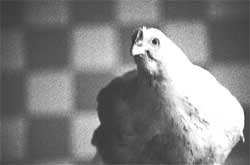Chicken worries
Chicken worries

following the death of two people in Hong Kong due to a new strain of influenza virus (a h5n1) that was mysteriously transmitted from poultry to humans, the Malaysian province of Sabah has imposed a complete and immediate ban on import of livestock, poultry and related products from Hong Kong. The veterinary services department of Malaysia is monitoring the outbreak of the "bird flu" influenza in Hong Kong, which has afflicted five people besides the two deaths, two of whom are in serious condition.
Mohamed Nordin, the department's deputy director-general, said officials were in close contact with the Hong Kong veterinary authorities. He said the department was awaiting more information regarding the disease. "We are considering a ban on imported chicken and related food products from Hong Kong.The final decision will be subjected to information we receive from the authorities there," he said. "However, we want to stress that there is no immediate threat of the disease spreading to Malaysia and any ban now will be unwarranted," Nordin added.
Datuk Ibrahim Mokhtar, director of Sabah's veterinary services department, said the department had suspended all licences it had issued for the import of delicacies such as Chinese sausages, waxed ducks and roast geese from Hong Kong. "The ban will be in effect until such a time we are satisfied that the viral outbreak in Hong Kong is under control," Ibrahim said.
He added that the department's personnel, with the assistance of the Customs Department, would be screening thoroughly the baggage of passengers of incoming flights from Hong Kong. "Even a small amount of meat product or chicken is not allowed. Our staff have been directed to confiscate and destroy these items, should they find any," Ibrahim asserted.
The veterinary services department of the province of Negeri Sembilan is also on the alert, but assured consumers that the supply of chicken in the state was safe. Mustapa Abdul Jalil, director of the state department, said Negeri Sembilan did not import chicken, day-old chicks or even eggs from Hong Kong. "In fact, Negeri Sembilan produces more than enough chicken and exports some of them," he said yesterday.
N Ismail Daud, consultant with Universiti Kebangsaan Malaysia's food quality research unit said importers of food products should ensure that the items were purchased only from reputable manufacturers. "The onus should be on the importers to ensure that manufacturers adhere to good manufacturing practices," he commented.
The outbreak of a h5n1 strain of the influenza virus was first reported in April 1997 in the Yeon Long farm of Hong Kong (Down To Earth, Vol 6, No 12). Infected chicken at the farm began ignoring their food, slumped listlessly, and died within a few days. The infection spread rapidly and killed entire poultry populations in some areas.
On May 11, a three-year-old boy fell ill in Hong Kong and died in 10 days. Health authorities failed to identify the cause of death. Margaret Chan Fung, director of health, Hong Kong, sent samples of the viral culture from the boy's throat to three laboratories in the us, including the Centers for Disease Control and Prevention (cdc) in Atlanta, usa. The verdict was unanimous. This was the first time that the a h5n1 strain of the influenza virus - previously known to afflict only birds, pigs and horses - was found in a human being.
The panic that has set into health and veterinary authorities in Southeast Asia due to the emergence of a h5n1 has highlighted the problem of microbes traveling from animals to humans. Considering that millions of people cross borders daily in packed jumbo jets that traverse the globe within hours, the problem of microbes migrating and creating a health nuisance becomes very real. This is precisely how the human immunodeficiency virus (hiv) that causes aids - a cure for which is yet to be discovered - has spread to each and every corner of the world. The need to deal with this global threat through increased awareness is immediate.







